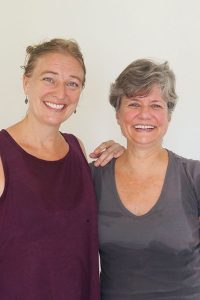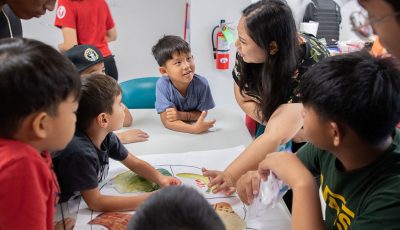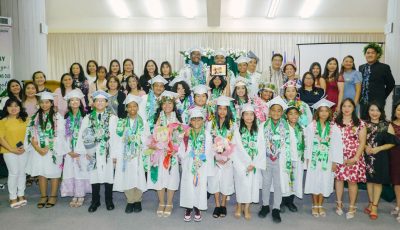New school to highlight local history, language

Susan Book and Diana Silveira of Isla Montessori School have years of Montessori training and experience under their belts and are ready to be of service to the community. (Bea Cabrera)
The Isla Montessori School in Dandan will open its doors in August, offering the Montessori way to pre-Kindergarten, Kindergarten, and elementary students.
What will make this program unique is that it seeks to integrate the Chamorro and Carolinian history and language, according to Susan Book, one of the founders of the school.
She said the school was born out of an idea that Montessori education needs to be brought to more to people on Saipan.
“Our goal is to reach out to families who doesn’t have access to Montessori education…[and] make it accessible to people in lower income brackets. …Dr. Maria Montessori began her work in the slums of Rome so Montessori began as something for every child,” she said.
Book said the idea behind the Isla Montessori School is that focus on the islands—its culture, language and history as a part of the curriculum.
She pointed out that teaching students with those components will connect those children with the community and the community back with the children.
“I feel it’s very important for the local culture to not be lost and, although it isn’t the culture I grew up in, Saipan is my home and I want my children to learn,” Book added.
The school will be located in the middle of peaceful neighborhood in Dandan.
“We really wanted a school in the neighborhood because a Montessori school is not traditional teaching. We don’t sit our children at desks as it is about making education almost second nature for the kids. Having the homey, neighborhood feel where you can walk to school in a safe environment, you feel like you’re at home and yet you are actually learning,” Book said.
“Part of Montessori is community outreach [and] a big part of that is going out to the community and giving back. We plan to open adult education nights and our after-school programs will not just be for students enrolled here but also students in the neighborhood,” Book added.
Part of making the Montessori accessible is talking to Child Care and Development Fund and to Chamorro and Carolinian history and language experts to help with the curriculum design.
“CCDF has funding to give to eligible parents who are either working or in school to be able to receive tuition vouchers, funding for after-school programs and summer school. …We are also approaching local businesses for sponsorship and donations that will benefit students,” Book said.
“We also talked to the Department of Culture and Community Affairs…to help us create materials that are specific to [the] Chamorro and Carolinian languages, help us create our history curriculum. …We are hoping to create a relationship with man’amko to make sure the children can learn from their elders,” she added.
Book belied the notion that Montessori students can just do whatever they want.
“It is actually extremely planned and very organized on the teacher’s side, so the students have opportunities to safely explore. As a guide, my job is to inspire them, give them the seed to make them want to learn more and help them in their journey in figuring it out… We want to create children who are…solving problems and are resourceful,” she said. “Our Montessori is not just academics, we are educating the whole child. …What we want to come out of our classrooms are children who are socially responsible, who can think for themselves and are lifelong learners.”
Book said the growth of Isla Montessori School is grassroots movement. “The team that decided to come together and do this is highly motivated—an amazing group of community members and the support that we are receiving from local community is outstanding.”
“We want to grow Montessori on the island. Currently, there is no Montessori educator training here, so most of the teachers are expats. One of our long-term goals, especially when we find interested individuals in this kind of education, is to foster and help them in their own Montessori training, help them open up more schools in the other villages on Saipan and Tinian,” she added.



























